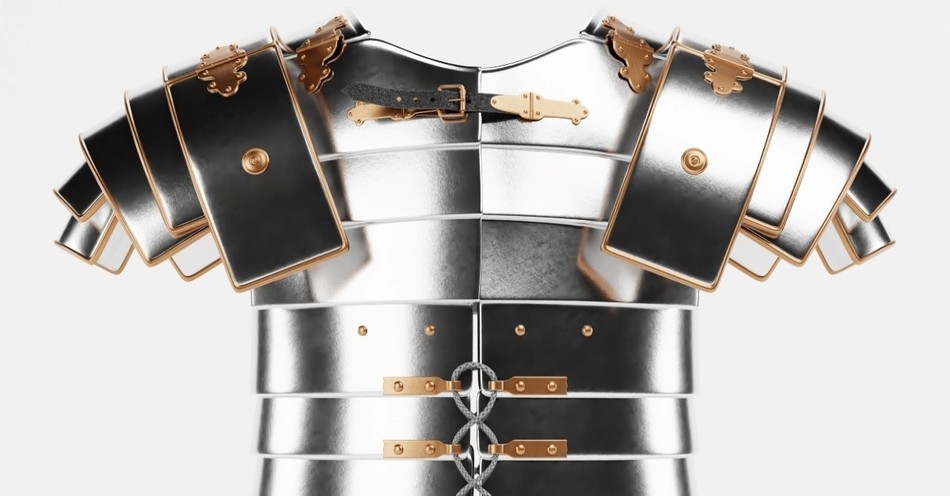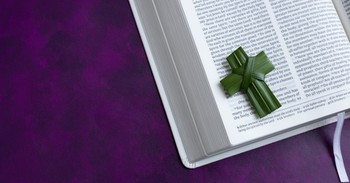"Stand firm then, with the belt of truth buckled around your waist, with the breastplate of righteousness in place" - Ephesians 6:14
Did you know that you’re in a battle? Sometimes it’s obvious: we feel as if we’re being attacked on every side. Nothing is going right, and we face hardship and suffering. Other times, life is pretty good, and it’s easy to forget there’s a spiritual battle being fought in the heavenly realms. What’s being fought over? You. And me. Not just us, but we’re part of the fight. The good news is we aren’t left to fight on our own. God gives us spiritual armor; part of that armor is the breastplate of righteousness. That’s the one I want to talk about today.
Before we take a closer look at the breastplate of righteousness, let’s remind ourselves of the battle and our role in it. Ephesians 6:10-13 (ESV) reads:
“Finally, be strong in the Lord and in the strength of his might. Put on the whole armor of God, that you may be able to stand against the schemes of the devil. For we do not wrestle against flesh and blood, but against the rulers, against the authorities, against the cosmic powers over this present darkness, against the spiritual forces of evil in the heavenly places. Therefore take up the whole armor of God, that you may be able to withstand in the evil day, and having done all, to stand firm.”
We can be strong in the Lord. We can withstand the attacks of the evil one and the devil’s schemes. We’re to take up or put on the whole armor of God, and then we can stand firm against those attacks. Part of that armor is the breastplate of righteousness. Let’s take a closer look at that particular piece of armor.
Where Does the Bible Mention the Breastplate of Righteousness?
Did you know that before it's mention in Ephesians 6:14, we first see the breastplate mentioned in Isaiah 59:15-17? It is believed these verses are talking about the spiritual reign of Christ:
“Truth is lacking, and he who departs from evil makes himself a prey. The LORD saw it, and it displeased him that there was no justice. He saw that there was no man, and wondered that there was no one to intercede; then his own arm brought him salvation, and his righteousness upheld him. He put on righteousness as a breastplate, and a helmet of salvation on his head; he put on garments of vengeance for clothing, and wrapped himself in zeal as a cloak.”
The breastplate is mentioned again in 1 Thessalonians 5:8. It says, “But since we belong to the day, let us be sober, having put on the breastplate of faith and love, and for a helmet the hope of salvation.” This time we’re encouraged to put on faith and love as a breastplate.
These verses give us a broader context to the passage most of us think of when the armor of God is mentioned. The full account of the armor of God is found in Ephesians 6:10-20. According to Gerald Peterman in The Moody Bible Commentary, the book of Ephesians was written by the Apostle Paul, most likely while he was under house arrest in Rome, around AD 60-62. Peterman also suggests the letter was likely intended for all of the Christians in Asia Minor, with Ephesus being the first to receive it. This shows us that the messages found in Ephesians were meant to reach a large community of believers, not just one church.
What Is the Breastplate of Righteousness Connected To?
The breastplate of righteousness is one part of the armor of God. The full armor, along with one offensive weapon, is listed in Ephesians 6:14-17 (italics mine):
“Stand therefore, having fastened on the belt of truth, and having put on the breastplate of righteousness, and, as shoes for your feet, having put on the readiness given by the gospel of peace. In all circumstances take up the shield of faith, with which you can extinguish all the flaming darts of the evil one; and take the helmet of salvation, and the sword of the Spirit, which is the word of God.”
Because a Roman soldier was guarding Paul while under house arrest, he likely used the armor he saw daily as inspiration. In my research for this article, I found many articles stating that the soldier’s belt was put on first, so we must put on truth before we put on righteousness. However, in my research on Roman armor, I didn’t find that to be the case. Let’s look at the different types of Roman armor to see why.
Adrian Goldsworthy’s book The Complete Roman Army discusses three types of body armor used by Roman soldiers. Lorica Segmentata, or plate armor, was the most famous. It consisted of segmented plates fitted together using buckles, hinges, hooks, and harnesses. The other types of body armor used were mail and scale armor, worn over a tunic like a shirt. In between the armor and the tunic would have been some padding.
I emailed Goldsworthy for further clarification, and he kindly responded with this helpful information:
“Mail and scale armor varied in length, but in most cases went fairly low on the hips. In these cases, the belt was worn over it rather than under it so had to be put on after donning the armor. In the case of a mail shirt the belt helped to carry the weight of the armor. … Lorica segmentata was shorter, and sometimes the belt seems to have been worn over and sometimes adjacent. In the latter case it is possible that sometimes the belt was put on first. Either way, it did not have the supporting role it played when wearing mail.”
We can’t be sure which type of body armor Paul was thinking of when he penned this letter. If it was mail armor, the belt would have been worn over top of the armor and would have played a big role in distributing the weight. Does this mean that truth helps us bear the weight of righteousness? I think we can say so—especially when we remember that Jesus Christ is truth (John 14:6). He’s also our righteousness, but we’ll get to that in a minute.
Do Christians Put on the Breastplate of Righteousness Together?
Paul is writing to churches who will read his letter together. Does this mean the church is supposed to put on the breastplate of righteousness together? The Greek word translated in these verses as “put on” is enduo. This may be my new favorite Greek word! It’s a verb that means “to sink into (clothing), put on, clothe one’s self.” I love the connotation of this word. Think about it: Paul is telling us to sink into righteousness. I live in Wisconsin, and the winters here are cold. There’s nothing better than grabbing my warmest, fuzziest shirt and sinking into the warmth of it on a blistering cold day.
Putting on the breastplate of righteousness is a singular activity. We each have to clothe ourselves with the righteousness of Christ. Each day we have to decide if we will live according to the ways of the world or if we will live in Christ. In The Moody Bible Commentary, Peterman writes, “Although prayer is important for the process described above (vv.10-17), believers do not ‘pray’ the armor onto themselves. Putting on the armor has to do with our moral choices—our lifestyle—that provide protection against the temptations of the world and the devil.”
That being said, there is a place for the church too. One of the major themes of Paul’s letter is unity. We need the church, our community (which Paul emphasizes so much in Ephesians), to help us make good decisions. Our community will encourage, challenge, and walk with us through life. But we must still personally choose to put on the breastplate because, in essence, we are putting on Jesus. We accept His righteousness’s gift and choose to walk in it.
What Does the Bible Say about Righteousness?
In Romans 3:10, Paul (yes, the same Paul who wrote Ephesians) declares, “None is righteous, no, not one.” No single person on earth is righteous, so God had to make a way for us. He did that by sending Jesus Christ to the earth. Jesus lived a sinless life and then died on the cross for the sins of every human who ever lived and will ever live on earth. He rose from the dead, conquering sin and death once and for all.
This is incredible, but it does us no good unless we believe it is true and choose to give our lives to God. In Romans 10:9, Paul writes, “if you confess with your mouth that Jesus is Lord and believe in your heart that God raised him from the dead, you will be saved.”
When we put our faith in Jesus, He becomes our righteousness. Again we find Paul’s words in 1 Corinthians 1:30-31, where he writes, “And because of him you are in Christ Jesus, who became to us wisdom from God, righteousness and sanctification and redemption, so that, as it is written, ‘Let the one who boasts, boast in the Lord.’”
When we first come to know Jesus Christ as our Lord and Savior, we, in essence, exchange our nonexistent cloak of righteousness for the righteousness of Christ. We have no reason to boast because everything we have, and everything we are, is a gift from God. It’s a gift we don’t deserve and could never earn, but it’s ours if we want it. What an incredible gift!
Let’s look again at Ephesians 6:14, and this time note a different emphasis. Paul tells readers to “Stand therefore, having fastened on the belt of truth, and having put on the breastplate of righteousness.” Because we have put on the breastplate of righteousness (and the other pieces of armor), we can stand firm against the attacks of the evil one.
But how do we do that? How do we fight in a realm we can’t see when physical and spiritual attacks come? We sink into the righteousness of Christ and the other armor God has given us. We pray, and we pray with confidence. We pray from a position of victory by remembering we’re united with Jesus Christ. We’re one with Him, and since He is victorious, we can be too. “And pray in the Spirit on all occasions with all kinds of prayers and requests. With this in mind, be alert and always keep on praying for all the Lord’s people” (Ephesians 6:18). If you don’t know what to pray, look to your one offensive weapon. The sword of the Spirit is the Word of God. Open your Bible and pray Scripture. If you’re wondering what to read, the Psalms are a great place to start!
I want to close with one last thing to remember: “We do not wrestle against flesh and blood, but against the rulers, against the authorities, against the cosmic powers over this present darkness, against the spiritual forces of evil in the heavenly places” (Ephesians 6:12). Remember who we’re fighting. Remember where the battle is being fought. Pray with spiritual eyes. Sink into Jesus.
Further Reading:
What Is the Full Armor of God?
What Is the Sword of the Spirit and How Should I Use It?
What Is a ‘Helmet of Salvation’ in Spiritual Armor?
How Do I Put on the Gospel of Peace as Spiritual Armor?
What Is the ‘Shield of Faith’ and How Do I Wear Mine?
Photo Credit: Getty Images/3drenderings

This article is part of our Bible resource for understanding the significance and meaning of biblical phrases and ideas. Here are our most popular Bible articles to grow in your knowledge of God's Word:
Promises of God in the Bible
Is "This Too Shall Pass" in the Bible?
What Was the Ark of the Covenant?
Top 10 Bible Stories for Kids
“Iron Sharpens Iron” in Proverbs 27:17
"Fearfully and Wonderfully Made" in Psalm 139
“Be Still and Know That I am God” in Psalm 46:10
"No Weapon Formed Against Me Shall Prosper" - Isaiah 54:17



